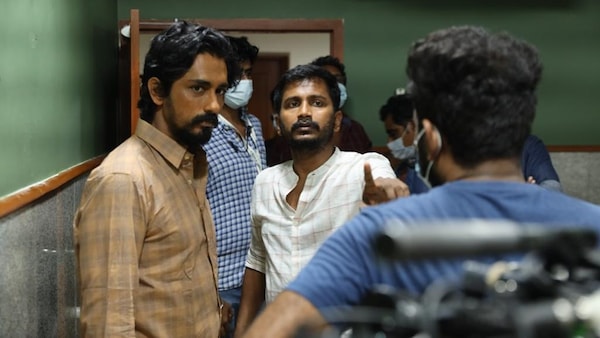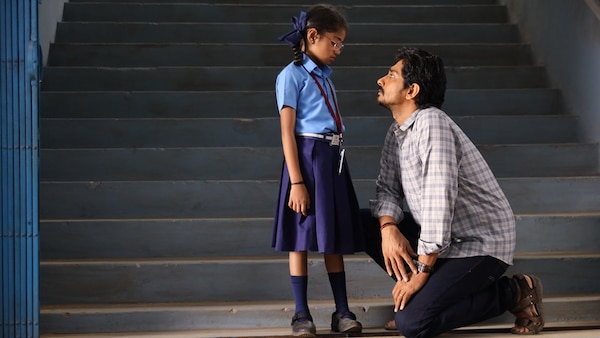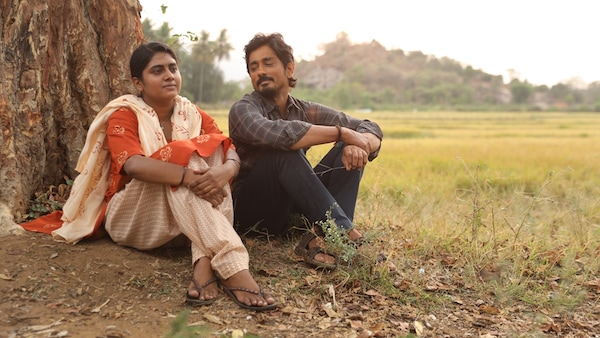Siddharth & SU Arun Kumar On Making Chithha, One Of 2023's Best Films
Chithha, widely hailed as one of the best Tamil films of 2023, is an intimate family drama/thriller that speaks sensitively about an issue oft sensationalised.

Last Updated: 05.39 PM, Dec 10, 2023
Chithha, directed by SU Arun Kumar and starring Siddharth, Nimisha Sajayan and Sahasra Shree, is that rare film which speaks about a sensitive topic with the sensibility it deserves, and with a touch rooted in realism. It speaks about human bonds, some that fray before strengthening again, and that fragile yet important topic called a child’s safety. More importantly, it firmly trains the lens on the child and the child’s universe, and on why it is important to learn to move ahead and not restrict a person’s life to an incident. That tender gaze is something we have missed in cinema.
Predictably, the film has been received well by critics and the audience, across languages. The film dropped on Disney+ Hotstar on November 28.The performances, which are lived-in, have also won much appreciation. For Siddharth, who has been pigeonholed somewhat because of his looks, this film is a great opportunity to show what he really is capable of.In an interview, Arun and Siddharth, who also produced the film, speak about the making process and choosing the gaze.
— ARUN KUMAR —
Arun, Chithha’s sensitive treatment shines through. Did you involve stakeholders in the scripting?
Yes, I did. This was a film where I was speaking about something far away from what I usually write about, and so I did a lot of research and got inputs from various people. The script was shown to quite a few stakeholders so that we don’t get anything wrong or hurt anyone.
I met a lot of survivors and it is through those conversations that I realised the child calls the perpetrator ‘uncle’ or ‘mama’ or ‘anna’, even after an assault. I went through the UNICEF guidelines, and read up so we never mis-represent.
Some of the things I heard shook me. That scene where the child hits the uncle. That is from a real-life story where the child could not even bear to see her father…The climax was written after speaking to some children who were abused. The idea was to tell them that there is someone who will be there for them.
You’ve received some very moving feedback…
I got an email from a young woman who is married with two children. I have no idea how she traced my ID. She shared her story. I have never received this kind of heartfelt feedback before. Mani Ratnam and Kamal Sir saw my movie. Vikram saw my movie and got in touch (Arun is working with Vikram next for Chiyaan 62).
Arun, let’s go back in time to 2018, to your third collaboration with your friend Vijay Sethupathi. You seemed to disappear after the negative reception to Sindhubaadh.
I needed that break, I needed solitude. I went out and travelled without a phone in hand. I did not do any cinema-related work for a year. I went to Malaysia. I watched movies, read books. I was in Thailand for a few months. My friends, including Sethu (Vijay Sethupathi), had my back. I took up courses in editing and screenwriting.
Sindhubaadh helped me know myself, and identify what I want as a filmmaker. If Pannayaarum Padminiyum had become a hit, there would not have been a Sethupathi. Because Sethupathi worked, I made Sindhubaadh. I took credit for Sethupathi’s success. I should also take the blame for Sindhubaadh not doing well. Those films taught me a lot about myself and where I needed to see myself.
What was the immediate reaction?
The phone grew silent. I did not get a single call. Luckily, I had not taken any advance for a film, so I was able to just switch off and move. I finally got time to think. I bonded with family. I am always grateful to the four friends who had my back. They showed me that one need not have 40 friends to feel loved.

Did it make you understand yourself as a director better?
Yes. The writing and making of Chithha helped me understand myself better. Till I was writing it, I did not know how I was going to shape it. I felt I was saying too much. But the two-and-a-half years of Chithha taught me to slow down, to live in the moment.
It changed me as a human being. My writing changed. My gaze changed. As a filmmaker, it taught me the things I can speak about. It showed me that I can also do this. Usually I only see the mistakes in my films. Chithha taught me to also see the good things.
Did you ever have a doubt as to how the film will be received?
Not really. Some people told me it looks like a ‘festival’ film. Some called it ‘arthouse’ cinema. I’m not a big fan of arthouse films. Festival films are a different thing altogether. We can’t keep slotting films in this day and age. A mainstream film like Parasite wins an Oscar today. I believe that if you take a film with a certain discipline and intent, it will find a global audience.
You managed to extract some great performances from your team.
I don’t think anyone ‘acted’ in the film. We workshopped and did the movie as a team. I think that work behind the scenes shows in the output on screen. It helped that I had some fabulous actors and non-actors on board. I think we all needed the film as much as it needed us.
— SIDDHARTH —
Siddharth, everyone who’s watched the movie has a scene they were most moved by. What was yours while performing?
Ah, that would be the breakdown scene in the bathroom. It was very draining. I’d gone through a personal bereavement earlier that day and was told about it just as I entered the set. Without deviating from the strength of the writing and the context, when I finished the scene, I was overwhelmed and Arun held me.
Chithha has received so much love and meant different things to different people. What does it mean to you as a producer and actor?
This is the film where I’ve tried to be the producer I studied to be and the one I aspire to be. For the first time, I’ve shown my film to my teachers Kamal Haasan Sir and Mani Ratnam Sir before release. Making Chithha has been a huge learning experience as an artiste and human being.
I am acutely aware of the fact that Chithha is bigger than me. For two years, we worked on it and made it the way it is. This is me trying to take education to the mainstream, in terms of social change. This film has the potential to change things, and it might take six months or a year, but it will do that.
How was it working with Arun, who came to you on the back of a box office failure?
Arun and I shook hands two years ago, and then began getting to know each other. We were two middle-aged men trying to find out what we wanted to create with each other. What I realised then in a small way, and now more concretely, is that while his mother and mine have not met, they’ve raised similar sons.
When he told me the story of Eswaran and Sundari and what happens in their lives, I was hooked. The story touched me. I am proud of the fact that I know someone like Arun, who managed to surprise even me with my performance.

Chithha has been praised by all as being very sensitive and forward-thinking.
We were very particular about that. Chithha has been shown to psychiatrists, survivors, those in the legal justice system and others who are stakeholders, and they approved of it. We were sure we would not release a film that was problematic in any way, using the excuse of cinematic liberty.
Arun spent six months researching for the film, to get the architecture, milieu and the people right. All films are set in a time and place, and the place becomes a personality and helps you understand the film better. We chose Palani.
We made the film with 100 percent integrity and without compromises. We shot for 69 days, with an equal mix of risk, ambition, passion and responsibility.
You’ve often been reduced to how young you look. It’s been a long cross to carry for two decades. How is this movie going to change things?
Eswaran is my 20-year-old dream come true. As an actor, you aspire to be part of something so real, you can become part of the furniture, be someone else. And that has always pushed my decisions to take up a project. I’ve never aspired to be a star. I always introduce myself as an actor. After Chithha, I think that has become clear.
All my life, I’ve been travelling and observing people, seeing how they live their lives. I got a chance to implement all of that with Arun’s film. He is someone who wants to create an impact in the theatre. That’s the only reward he seeks. This film is that reward.
How did you prep for the part?
I spent two months on performance workshops for the leads for this film. Rajesh Balachandran was our acting coach. We decided early on that everyone else will be newcomers, and that every speaking part will be workshopped. This film felt like a play. We began thinking as a group. This is a film where I’ve put my money where my mouth is.
What do you see the film’s social impact as?
The impact on the audience with their family in the theatre is incredible. As a writer, Arun takes viewers on a journey through crime and punishment. But he does not tell humans to turn vengeful. We could have made a third act that would bring in Rs 50 crore, but that was not the purpose. We did not want to end with everyone cheering.
Have you been this kind of a chithha to anyone?
Of course. I am like that with my nephews and nieces. My protective nature shows up when anyone is hurt. I too had such a chithappa to whom I was very close.

 Premium
Premium